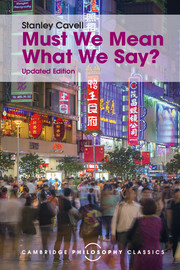Book contents
- Frontmatter
- Dedication
- Contents
- Permissions
- Acknowledgements
- Preface to this edition
- Preface to updated edition of Must We Mean What We Say?
- Foreword: An audience for philosophy
- 1 Must we mean what we say?
- 2 The availability of Wittgenstein's later philosophy
- 3 Aesthetic problems of modern philosophy
- 4 Austin at criticism
- 5 Ending the waiting game: A reading of Beckett's Endgame
- 6 Kierkegaard's On Authority and Revelation
- 7 Music discomposed
- 8 A matter of meaning it
- 9 Knowing and acknowledging
- 10 The avoidance of love: A reading of King Lear
- Thematic index
- Index of names
Foreword: An audience for philosophy
Published online by Cambridge University Press: 05 November 2015
- Frontmatter
- Dedication
- Contents
- Permissions
- Acknowledgements
- Preface to this edition
- Preface to updated edition of Must We Mean What We Say?
- Foreword: An audience for philosophy
- 1 Must we mean what we say?
- 2 The availability of Wittgenstein's later philosophy
- 3 Aesthetic problems of modern philosophy
- 4 Austin at criticism
- 5 Ending the waiting game: A reading of Beckett's Endgame
- 6 Kierkegaard's On Authority and Revelation
- 7 Music discomposed
- 8 A matter of meaning it
- 9 Knowing and acknowledging
- 10 The avoidance of love: A reading of King Lear
- Thematic index
- Index of names
Summary
If the essays which follow do not compose a book, collecting resonance from one another, nothing I can say in introducing them will alter that fact. The relations among them are no less complex than the complexities I have sought to trace within the essays themselves; and any concept I would wish to use in characterizing their relations is either itself already at work within the essays, so far as I have been able to put it to work, or else it would require the working of another essay to do what I would want with it. The surface thematic overlappings among the essays are, I think, sometimes surprising, or surprisingly numerous. Because it would be tiresome to list them here, I have made an index of the themes I find, and found as I wrote, to be of guiding importance. Certainly I do not by this mean to suggest that I have fully treated any one of these themes; a number of them are just glanced at. But I have in each case wished that the place I have made for a theme's appearance provides data for further investigation of it.
Although various portions or drafts of separate essays were being written during essentially the same period, I have as far as possible arranged them chronologically according to their date of completion. It will be said that two of them—those on Endgame and on King Lear—are pieces of literary criticism, or at best applications of philosophy, while the remainder are (at least closer to being) straight philosophy. I wish to deny this, but to deny it I would have to use the notions of philosophy and of literature and of criticism, and the denial would be empty so far as those notions are themselves unexamined and so far as the impulse to assert such distinctions, which in certain moods I share, remains unaccounted for. Its account must include the obvious fact that these subjects, as I conceive of them, do resemble one another.
- Type
- Chapter
- Information
- Must We Mean What We Say?A Book of Essays, pp. xxx - xlPublisher: Cambridge University PressPrint publication year: 2015

